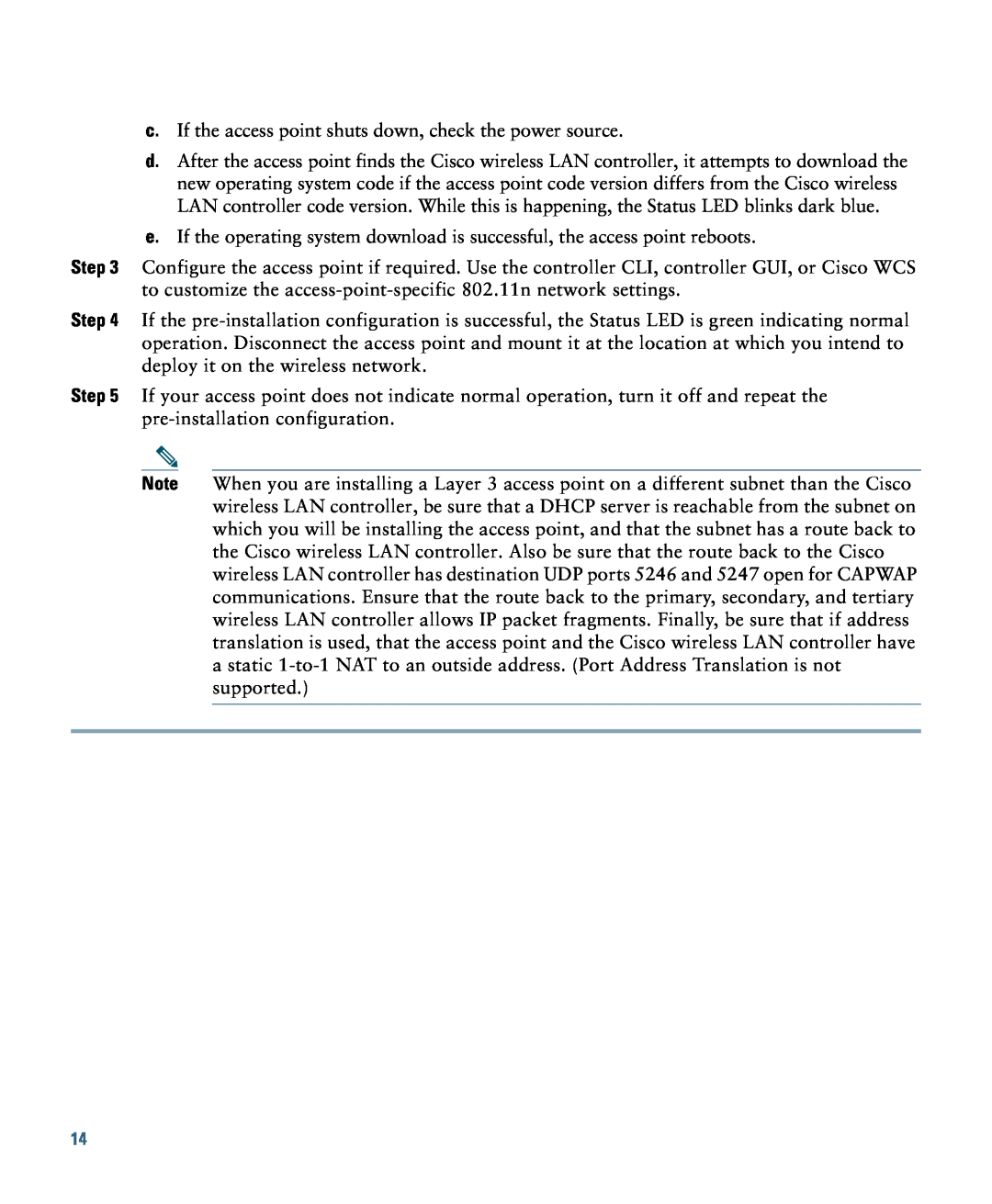Contents
Cisco Aironet 3600 Series Lightweight Access Points
GETTING STARTED GUIDE
2 Introduction to the Access Point
1 About this Guide
translated safety warnings that accompanied this device. Statement
3 Safety Instructions
IMPORTANT SAFETY INSTRUCTIONS
SAVE THESE INSTRUCTIONS
20A. Statement
External Antennas
5 Configurations
4 Unpacking
Countries Supported
Internal Antennas
Regulatory Domains
6 Access Point Ports and Connectors
272377
LED indicator
Figure 2 Access Point LED Indicator top-3602I Model
7 Configuring the Access Point
The Controller Discovery Process
Preparing the Access Point
Installation Summary
Performing a Pre-Installation Configuration
Pre-Installation Configuration Setup
Controller Layer 3 devices Cisco Aironet access points
C1880 switch
Step 2 Apply power to the access point
2106 controller WS-C3550, WS-C3560, and WS-C3750 switches
2600, 2610, 2611, 2621, 2650, and 2651 multiservice platforms
c. If the access point shuts down, check the power source
8 Mounting the Access Point
9 Deploying the Access Point on the Wireless Network
10 Installing Modules
Installing a Module
Step 5 Screw down the thumb screws on the module
Using DHCP Option
11 Troubleshooting
Guidelines for Using Cisco Aironet Lightweight Access Points
Checking the Access Point LED
Status LED
LED Status Indications continued
Troubleshooting the Access Point Join Process
12 Declarations of Conformity and Regulatory Information
Tested To Comply With FCC Standards FOR HOME OR OFFICE USE
Access Point Models
Module Models
VCCI Statement for Japan
English Translation
Guidelines for Operating Cisco Aironet Access Points in Japan
Japanese Translation
03-6434-6500
Canadian Compliance Statement
Statement 371-Power Cable and AC Adapter
Industry Canada
Module Models
Access Point Models
European Community, Switzerland, Norway, Iceland, and Liechtenstein
Page
EMC-EN 301.489-1 v1.8.1 EN 301.489-17
Health & Safety-EN60950-1 2005 EN 50385
The following standards were applied
Radio-EN 300 328 v 1.7.1 EN 301.893 v
Declaration of Conformity for RF Exposure
Generic Discussion on RF Exposure
This Device Meets FCC Guidelines for Exposure to Radio Waves
Additional Information on RF Exposure
Administrative Rules for Cisco Aironet Access Points in Taiwan
Chinese Translation
Administrative Rules for Low-power Radio-Frequency Devices Article
Operation of Cisco Aironet Access Points in Brazil
Regulatory Information
Declaration of Conformity Statements
Portuguese Translation
Cisco AP c3600
13 Configuring DHCP Option 43 and DHCP Option
Cisco AP c3600-ServiceProvider
Specification
14 Access Point Specifications
Type + Length + Value
Category
refer to Channels and Maximum Power Settings for Cisco Aironet
Access Point Specifications continued
15 Obtaining Documentation and Submitting a Service Request
